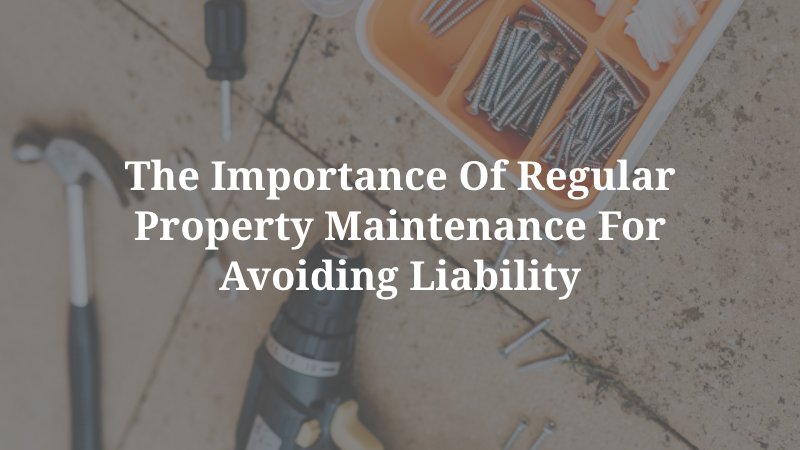The Importance of Regular Property Maintenance for Avoiding Liability

Property maintenance is essential to avoid liability because it helps ensure that the premises are safe and free of hazards. If the property owner fails to maintain their property adequately, they may be held liable for any injuries resulting from their negligence.
Types of Regular Maintenance
Here are some types of property maintenance that property owners can regularly implement to avoid liability for injury:
Regular Inspections
Regular property inspections can help identify potential safety hazards and prevent accidents before they occur.
Prompt Repairs
If any safety hazards are identified during the inspection, fix them as soon as possible to avoid any accidents.
Adequate Lighting
Proper lighting is essential to avoid injuries on the property, especially in areas such as walkways and staircases.
Slip-Resistant Surfaces
Surfaces such as floors, stairs, and walkways should be slip-resistant to prevent slips and falls.
Proper Signage
Signage should warn against potential safety hazards, such as wet floors or uneven surfaces.
Fire Safety Measures
The property must have proper fire safety measures in place, such as smoke detectors, fire extinguishers, and emergency exits.
Regular Training
When applicable, property owners should provide regular safety training to their staff and tenants to promote safe practices and prevent accidents.
When Can a Property Owner Be Held Liable?
Whether a property owner is liable for an injury will ultimately depend on the specific circumstances of each case, including the nature of the injury, the cause of the injury, and the conduct of both the victim and the property owner. Property owners can generally be liable if they fail to maintain their property in a reasonably safe condition, resulting in harm to someone else. For example, a property owner might be responsible if they neglect to repair a broken staircase or remove ice from the walkway leading to their building, which leads someone to fall and sustain injuries.
Additionally, property owners may be liable if they are aware of a dangerous condition on their property and fail to take reasonable steps to warn visitors or prevent harm, such as by putting up warning signs or barricades. As a result, regular property maintenance, such as fixing leaky pipes, repairing broken stairs, or replacing faulty wiring, can help prevent accidents and minimize the risk of liability. Property owners should also ensure that they have liability insurance coverage to protect themselves in case of an accident or injury on their property.
Common Causes of Premises Liability Claims
Premises liability claims commonly arise due to the following types of negligent property maintenance:
- Broken railings
- Worn and uneven flooring
- Crumbling steps
- Slippery conditions (e.g., spilled liquids, leaky coolers, and recently mopped floors)
- Poor lighting obscuring potential hazards
- Debris or lose materials in a walkway
- Damaged walkways or parking lots
- Potholes, pits, or other open holes
- Inaccurate stacking or securing of inventory
- Escalator failure
- Elevator malfunction
A minor accident can be all that is needed to cause a traumatic brain injury, break a bone, or damage the spine.

